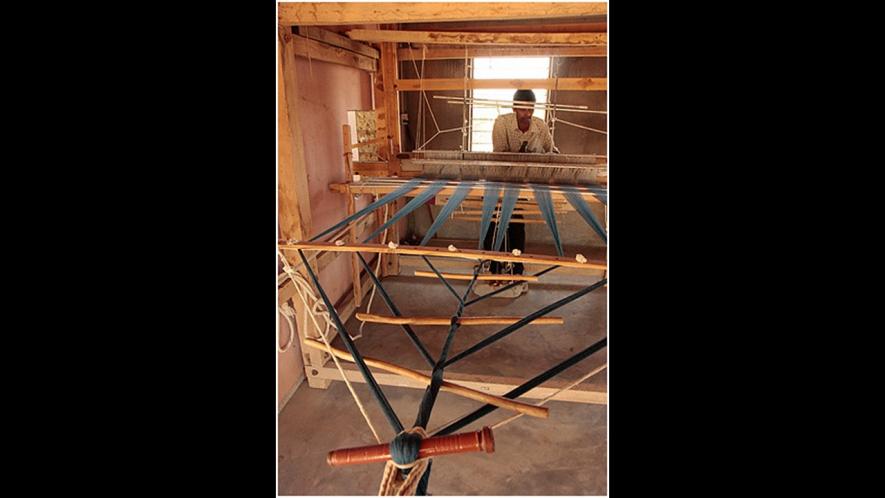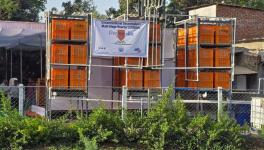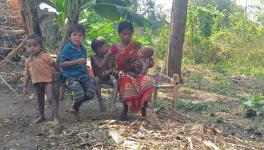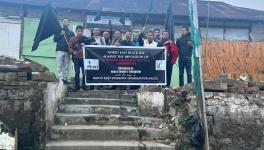COVID-19: Amid Shutdowns, Gujarat Workers Fear for Health and Employment

Representational image. | Image Courtesy: flicker
Seven persons have been tested positive for COVID-19 in Gujarat. The state entered the list of affected states after two coronavirus cases were confirmed positive in Rajkot and Surat on March 19. On March 20, three more cases were confirmed to be positive in Ahmedabad and two in Vadodara.
In a press conference, Jayanti Ravi, principal secretary (health), Gujarat, stated, “All the persons who have tested positive have been kept in isolation in hospitals in their respective cities. So far, Gujarat has five positive cases of COVID-19 and results of 23 cases are awaited.”
“Among the cases that have been tested positive, most are below 35 years of age and are stable. Most of the patients are asymptomatic,” added Ravi.
All the cases so far in Gujarat have history of foreign travel. The patients in Ahmedabad had travelled from Finland, New York and UK. In the third case, the patient landed in Ahmedabad on March 18 and came in contact with 11 people including five family members, all of whom have been quarantined. The patient in Rajkot had returned from Mecca, landed in Mumbai and travelled to Rajkot by train. The patient in Surat had travelled from UK. Two patients in Vadodara had travelled from Spain and Sri Lanka.
Apart from two cases in Vadodara—where the patients are 49 and 62 years old—rest of the patients are under 35 years of age.
Laboratories and Testing
Gujarat had begun placing people, mostly students returning from China, under medical observation from late January. In early February, as per Health Department officials, 59 people were monitored for 14 days and let go after testing negative for COVID-19. Till March 8, a total of 2,107 residents of Gujarat with history of travel to China and other countries were put under surveillance, but were tested negative.
The first testing laboratory was set up in Ahmedabad in the first week of February after Civil Hospital, Ahmedabad received diagnostic reagent kits from Department of Virology and Microbiology of National Institute of Virology (NIV), Pune which had been the only testing centre until then to be able to determine the presence of novel coronavirus. The virology laboratory in BJ Medical College or Civil Hospital already had facilities for using the RT-PCR, a laboratory technique involving transcription of RNA (ribonucleic acid) into DNA that led to the molecular diagnosis of the coronavirus. The facility was established during H1N1 (swine flu) outbreak in Gujarat. On March 7, another testing facility was launched at MP Shah medical college, Jamnagar.
One hundred and eighty-nine cases have been tested at the two centres so far.
Four testing, centres at SVP Hospital, Ahmedabad, Sir Takthsingh Medical College, Bhavnagar, Sir Saiyajirao Gaekwad hospital, Vadodara and New Civil hospital, Surat are ready with the required facilities and await permission to start functioning.
After the detection of positive cases in Gujarat, Jayanti Ravi stated, “We have the capacity to test 200 samples a day. And we are hoping to get [permission for] two additional laboratories from ICMR by March 21.”
Safety and Precautions
All four municipal corporations—Ahmedabad, Vadodara, Surat and Rajkot—issued notice on March 20 to shut down all restaurants and eateries. Earlier, schools, colleges, swimming pools, national parks, museums and other public places of interest like Statue of Unity were shut down in the wake of the global outbreak.
Meanwhile, Gujarat High Court has admitted a suo moto PIL and issued notice to the state government to take precautions in the judicial setup. Apart from sanitation of the buildings, litigants have been discouraged from attending the court. Only urgent matters are being heard and library, canteen, bar rooms, etc. are set to remain closed till March end.
Owing to the ‘Janata Curfew’ to be observed on March 22, all modes of public transport have been called off for a day.
“All intra city and inter city state transport buses—buses of GSRTC, city buses and Jan Marg BRTS will remain shut on Sunday across Gujarat,” CM Vijay Rupani said in a press conference on March 20.
No respite for workers and labourers
Federation of Surat Textile Traders Association (FOSTTA) announced on March 20 that textile market and mills will remain shut from March 21 to March 24.
“The market and mills shall resume at 2 pm on March 24,” stated Champalal Bothra, President of FOSTTA, in a press note.
However, diamond industry of Surat has not declared a shutdown amid the corona scare.
The two industries together employ more than 20 lakh workers, who have mostly migrated to Gujarat from Odisha, Bihar and Uttar Pradesh. Most labourers have to pay on a daily basis for basic needs and live in congested urban ghettos sans basic amenities and work in inhumane conditions.
However, at the cost of being unemployed, a large number of workers, especially from textile industry, have reportedly left for home states since February. Those who are left behind are worried about both their employment and health.
“We live in a rented space on rotational basis. How are we supposed to maintain the precautions required to stop the coronavirus? Besides, we depend on the money we get daily from working in the mills. Now that it is set to remain shut for three days, we don’t know how we will sustain,” says Rakesh Yadav, a migrant worker from Bihar staying in Kadodara area of Surat.
Kadodara is one of the many urban ghettos of migrant textile workers in Surat. Yadav, like most mill workers, comes back to reside in a rented space that belongs to him only for 12 hours a day. Yadav shares the 10x10 room with around 10 or 12 other workers who occupy the space on ‘first-come’ basis after 12-hour work shift.
“This room can accommodate six people at once. Twelve people rent this as we work in shifts. Now that the mills are to remain closed for three days, how will 12 people stay in this room? Besides there will be water scarcity too,” says Yadav.
The Surat Diamond Association (SDA) has decided to not shut its units, but ensure cleanliness and create awareness about the outbreak while functioning.
According the office-bearers of SDA, for the industry that employs over five lakh diamond workers, closure would result in large-scale unemployment. Besides, the industry is already operating at less than 40% due to major decline in export products owing to the COVID-19 outbreak.
This apart, ceramic industries, automobile industries and various factories operating in GIDCs across Gujarat have not yet announced to relieve its workers, in the view of corona pandemic.
The sanitation workers of civic bodies are also expected to work as usual.
Get the latest reports & analysis with people's perspective on Protests, movements & deep analytical videos, discussions of the current affairs in your Telegram app. Subscribe to NewsClick's Telegram channel & get Real-Time updates on stories, as they get published on our website.
























